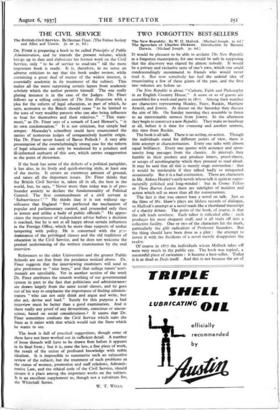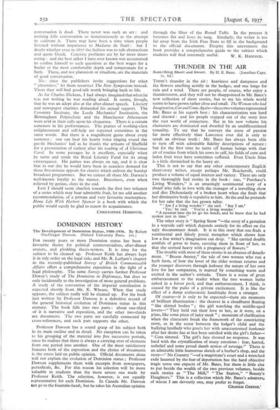TWO FORGOTTENFORGOTTEN BEST-SELLERS
Iv would be pleasant to be able to acclaim The New Republic as a forgotten masterpiece, for one would be safe in supposing
that the discovery was shared by almost nobody. It would be a private and exclusive taste of one's own, which one could condescendingly recommend to friends who would never
read it. But now somebody has had the unkind idea of resuscitating a few of these giants of the past, and the first two volumes are before us.
The New Republic is about " Culture, Faith and Philosophy in an English Country House." A score or so of guests are assembled for a week-end party in 1877. Among their number are characters representing Huxley, Pater, Ruskin, Matthew Arnold, and jowett. At dinner on the Saturday they discuss
the aim of life. On Sunday morning they assemble to listen to an interminable sermon from Jowett. In the afternoon they begin to construct a new Republic. They make no headway at all, before it is time for evensong and another sermon, this time from Ruskin.
The book is all talk. There is no setting, no action. Though the individuals stand for different points of view, there is little attempt at characterisation. Every one talks with almost equal brilliancy. Every one quotes with accuracy and spon- taneity long passages from the classics. At intervals they fumble in their pockets and produce letters, proof-sheets, or scraps of autobiography which they proceed to read aloud. It may be said that all this is merely stage convention : that it would be intolerable if they talked badly or misquoted occasionally. But it is a bad convention. There are characters in Mr. Aldous Huxley's early novels whose talk is quite as super- naturally polished and long-winded : but in Crome Yellow or Those Barren Leaves there are sidelights of incident and action which tell us more than all the conversations.
The fact is that you cannot base a novel on talk. Just as the films of Mr. Shaw's plays are lifeless records of dialogue, so Mallock's attempt at a novel reads like a shorthand transcript of a charity debate. The point of the book, of course, is that the talk leads nowhere. Each talker is ridiculed alike : each produces his most eloquent stuff, and it all trails off into a collective futility. One or two of the characters hit the mark, particularly the glib radicalism of Professor Saunders. But the thing should have been done as a play : the attempt to invest it with the incidents of a novel merely disappoints the reader.
Of course in 1877 the individuals whom Matlock takes off were very much in the public eye. The book was topical, a successful piece of caricature : it became a best-seller. Today it is as dead as Dodo itself. And this is not because the art of conversation is dead. There never was such an art : and nothing kills conversation so instantaneously as the attempt to cultivate it. There may have been a time when people listened without impatience to Madame de Sue : but I ' doubt whether even in 1877 the fashion was to talk abstractions and quote Greek. Concrete problems are by far more -inter- esting : and the best talker I have ever known was accustomed to confine himself to such questions as the best wages for a butler or the most comfortable depth and temperature for a bath. These, and not platonism or ritualism, are the materials of good conversation.
No : since the publishers invite suggestions for other " phoenixes," let them resurrect The New Symposium instead. There they will find good talk worth bringing back to life.
As for Charles Dickens, I had always imagined that when he was not writing he was reading aloud. It seems, though, that he was an adept also at the after-dinner speech. Literary and newspaper charities demanded his annual support. The Coventry Institute, the Leeds Mechanics' Institution, the Birmingham Polytechnic and the Manchester Athenaeum were avid in their calls upon his eloquence. There is a certain sameness in his performances. The praises of working-class enlightenment and self-help are repeated sometimes in the same words. But there is a magnificent gusto about every sentence : one can hear his hearty voice ringing round the gas-lit Mechanics' hall as he thanks the artisans of Sheffield for a presentation of cutlery after his reading of A Christmas Carol. In some passages he is excellent, especially when he turns and rends the Royal Literary Fund for its smug extravagance. His pathos was always on tap, and it is clear that in our day he would have been in ceaseless demand for those five-minute appeals for charity which enliven the Sunday broadcast programmes. But we cannot all share Mr. Darwin's well-known loyalty to the master. Breeziness, even when relieved by genius, cloys in the end.
Lest I should seem churlish towards the first two volumes of a series which may bear admirable fruit, let me add another recommendation, of a private and very favourite masterpiece. Home Life With Herbert Spencer is a book with which the public would surely be glad to renew its acquaintance.
CHRISTOPHER HOBHOUSE.







































 Previous page
Previous page